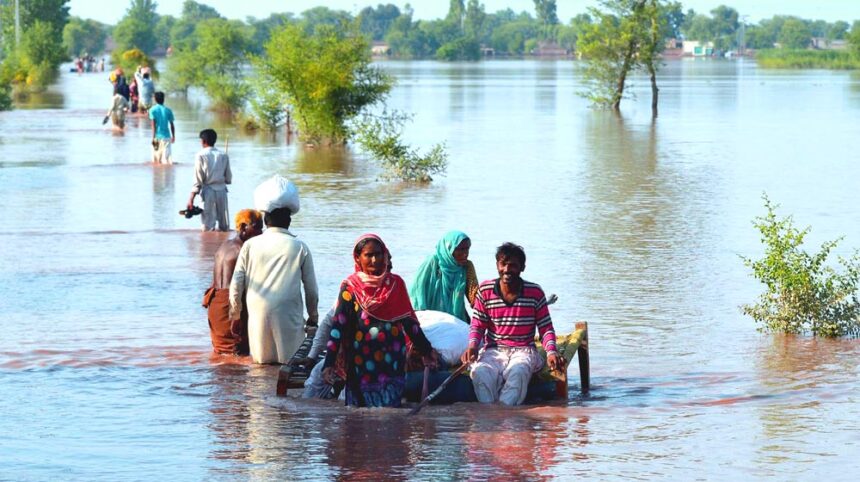The world is facing one of the most devastating threats ever known to mankind, the threat of global warming and climate change. Weather all across the globe has been disturbed and affected due to the emission of greenhouse gases, especially CO2 and carbon monoxide. Pakistan is also facing the brunt of climate change and it is the need of the hour to raise the level of public awareness regarding natural disasters.
One of the biggest threats in Pakistan is the danger of floods. There are areas in Sindh province that were severely affected by floods in 2010, 2011 and 2020. In August 2020, 20 districts of four divisions were declared as calamity-hit areas due to flooding caused by the monsoon rainfall. The havoc caused by the monsoon downpours, resulted in over 2.4 million people being displaced, over 1 million acres of standing crops damaged, 77,343 houses destroyed completely, 137,178 houses partially damaged and 45,961 cattle killed.
In order to raise awareness and highlight urgency of the challenges induced by Climate Change, especially the floods,Cesvi Pakistan is working in the most flood-affected areas of South Sindh, exclusively District Mirpur Khas, in collaboration with ECHO (European Civil Protection and Humanitarian Aid Operations).This series of articles under the umbrella campaign of “Rehna Hai Tayaar” or “We have to be prepared” is an effort on behalf of Cesvi Pakistan to evade and mitigate the impact of climate change in Pakistan.
Flood risk has increased due to increased global warming and one has to be prepared for it. Let’s be aware of the three stages of flood for us to prevent maximum loss of life and valuables.
Before a Flood
To prepare for a flood, you should:
- Prepare a Home First Aid Kit consisting of essential items like Emergency contact numbers, First aid manual, Band-Aids, Hydrogen peroxide, Thermometer, Sterile gauze pads, Adhesive tape and bandages, Safety pins, Scissors, Tweezers, Disposable gloves, Antiseptic wipes or soap, Emergency blanket, etc.
- Keep handy an Emergency Supplies Kit for natural disasters which may include bottled water, Non-perishable food, Flashlight with extra batteries, Battery-powered radio, Whistle, Spare cash, Important documents like (CNIC), health card, Candles, matches or lighter, Extra clothing to change into, Personal hygiene items, Prescriptions and medications, Toilet paper, Extra mobile chargers, Baby food supplies, Tool kit, etc.
- Make sure that valuable items are shifted at a higher ground.
- Open drainages and sewerage lines.
- Secure cattle and livestock
During a Flood
If a flood is likely in your area, you should:
- Turn off the main electricity switch of your home.
- Be aware that flash flooding can occur.Evacuate yourself and your family first to a safe place or higher ground.
- Do not wait for instructions to move.
- After securing yourself and your family, help your neighbors and community.
- Make sure that the most vulnerable segment of the society consisting of children, women, elderly, persons with disability, transgenders, etc., are given priority in the rescue and evacuation process.
- Never try to cross a stream, drainage channels, river or gushing water during a flood.
- Listen to the radio or television for information.
After a Flood
Although floodwaters may have receded in some areas, many dangers are still there. Here are some things to remember in the days ahead:
- Avoid crossing moving water.
- Stay away from damaged areas and buildings.
- Help your community in any way possible, especially the rescue workers.
- Search for sources of essential supplies for your family and relatives.
- Give first aid to the person requiring it and take others requiring medical treatment to clinics and hospitals.
- Give way to ambulances and emergency workers.
- If you must walk or drive in areas that have been flooded.Stay on firm ground.
- Be cautious, standing water may be electrically charged from underground or downed power lines.
Staying HealthyAfter a Flood is Essential
- A flood can cause physical hazards and emotional stress. You need to look after yourself and your family as you focus on cleanup and repair.
- Avoid floodwaters; water may be contaminated by oil, gasoline or raw sewage.
- Rest often and eat well.
- Keep a manageable schedule. Make a list and do jobs one at a time.
- Discuss your concerns with others and seek help. Contact Red Cross for information on emotional support available in your area.
If all these aforementioned things are thought out carefully and acted upon, one can evade a lot of dangers, risks, loss and stress: before, during and after a flood.
Floods are among the most common and devastating types of natural disasters. They can happen in a wide variety of places and no two floods are exactly the same. Everyone should prepare for floods, no matter where you live, it is especially important to be prepared if you live near water, dams, or in a low-lying areas.







